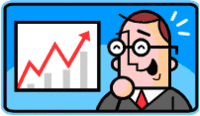| Home | About | Archives | RSS Feed |

@theMarket: What Will the New Year Bring?
 |
It was a good year for the stock market. The S&P 500 Index was up in excess of 12.5 percent with the other averages putting in a good performance as well. Naturally, investors are hoping for another year of stellar returns. Is that a reasonable expectation?
At the beginning of each year, people like me are expected to gaze into crystal balls or swirl the tea leaves at the bottom of a cup and pontificate on what the New Year will be like for investors. Unfortunately, I have an "Eight Ball" but no crystal ball and I drink coffee not tea. Honestly, I have as much chance of calling the market over the next 12 months as you do. However, there are some things I do know to be true.
Working from the top down, I expect the U.S. economy to continue to grow, while unemployment declines further. As jobs gain, I also expect wage growth will finally begin to accelerate. Coupled with the declining price of oil, that spells higher consumer spending than most anticipate. And since consumers drive over 67 percent of GDP growth, I’m looking for a better than expected first half in the United States.
As for Europe, I am in the minority when looking at the prospects among the members of the European Union. Although Europe is teetering on the edge of recession, the European Central Bank does not appear to have the political backing to launch a U.S.-style quantitative easing program. ECB head, Mario Draghi, continues to promise more, but delivers less and less. Unless the ECB does implement a full QE, the prospects for the continent appear neutral to negative at best.
However, there are also risks ahead that could substantially change the playing field in Europe. The southern tier of European countries will hold elections this year. Populist movements, led by long-suffering voters in Greece, may repudiate the austerity programs that the northern, economically-stronger countries have demanded in exchange for bail-outs over the last few years. If that were to occur, all bets are off as far as investing in the European stock markets and the Euro currency as well. There are therefore too many risks that depend on politics and not economics for my liking.
Over in Asia, readers are aware that I like China. I am betting that the government there will continue easing monetary policy and stimulating an economy struggling with a transition from an export-led to a consumer-led economy. Japan, on the other hand, is in the middle of a full-fledged quantitative easing program that will hopefully pay positive economic dividends in 2015.
That leaves me liking the three largest economies in the world: China, the United States and Japan. In addition, I believe the U.S. dollar will continue to rise in 2015 while the Japanese yen and the Euro will continue to fall. There are specific exchange-traded and mutual funds that allow investors to invest in these areas. Let me know if you are interested.
Readers must be aware that what happens economically may not translate into gains for stock markets. Remember, that most markets discount economic events six to nine months into the future. In which case, the U.S. stock market may have already discounted mush of the growth I see, especially in the first half of the year. On the other hand, most investors are so U.S.-centric that they either do not believe or ignore the prospects for China and Japan.
In my next column, I will get down to particles in what I see are the risks and rewards for the stock markets in the year ahead.
Bill Schmick is registered as an investment adviser representative with Berkshire Money Management. Bill’s forecasts and opinions are purely his own. None of the information presented here should be construed as an endorsement of BMM or a solicitation to become a client of BMM. Direct inquires to Bill at 1-888-232-6072 (toll free) or email him at Bill@afewdollarsmore.com.

